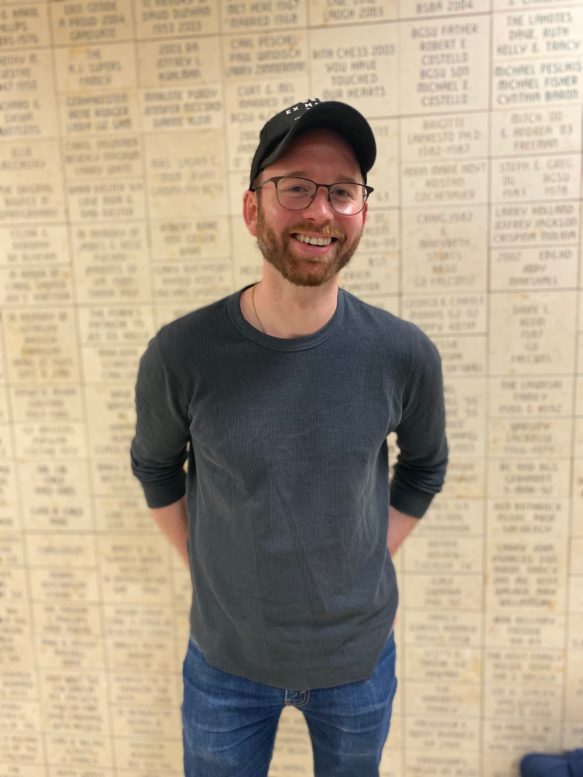By JULIE CARLE
BG Independent News
James Peet is getting his wish to be a dirt farmer in Wood County.
The Bowling Green State University nontraditional student pitched his idea for Black Gold Composting during The Hatch 2023, BGSU’s “Shark Tank”-like entrepreneurship competition. All six of this year’s investors agreed Peet’s concept was worth the $8,000 he requested to incubate the composting project.
“I think it’s a big idea worth going after. I’m in,” said investor Emanuele “Manny” Conti ’89, operating partner with Welsh, Carson, Anderson & Stowe.
Peet, from Bowling Green, was one of six “hatchlings” that presented entrepreneurial concepts during the live-streamed event Thursday evening, and one of four whose funding requests were granted by the investors.
Black Gold Composting is an idea that’s been percolating for many years, especially after Peet stepped away from studying biology at BGSU about nine years ago. He traveled with a bluegrass band, worked in landscaping and fine dining, and managed a small breakfast restaurant.
His years in the restaurant industry opened his eyes to the number of food scraps that are wasted and thrown into landfills.
“Now that I’ve taken time off and had life experiences, I can come back with serious gumption and direction and take it more seriously,” he said. “I’m not saying I have it all figured out, but at least I have a clearer goal and am ready to prove that I can see something through and do it well.”
Peet hopes to close the loop between wasted groceries, methane production, water contamination and soil health. He believes the crux of the problem and the focus of the composting project lies in the fact that the U.S. is losing topsoil 10 times faster than it can be replenished.
“People are worried about emissions, climate change and rising levels of oceans and seas. These are important issues, but we have to worry about the soil and soil health, where our plants come from,” he said.
The soil aggregate from Black Gold Composting could improve the porosity and health of the soil, which could help reduce dependence on phosphates and nitrogen. “If we can get away from the seasonal fertilizer applications, it would almost immediately increase the health of our water supply by keeping in check the algal blooms that compete and deprive our freshwater of oxygen,” he said.
Peet’s original plan was a lofty ask that was more like a Shark Tank request for $1.2 million to establish an industrial-level composting business on 50 acres with heavy equipment. He wanted to be able to provide healthy soils at a large scale for farmland. When he learned Hatch requests needed to be more modest, he scaled it back to one acre, an industrial thermometer and hydrometer, a couple of pitchforks and wheelbarrows. His dream of providing enough compost for wide use in agricultural fields will have to wait. During the first year, the two 26-week cycles of composting will start off as bagged compost to be sold locally.
The investors were impressed with the legwork Peet had already put into the project by making important contacts, as well as taking on the manual work required on the one-acre start-up. To have healthy compost break down effectively, he knows the process requires one part nitrogen, in the form of food scraps, to four parts carbon, from wood chips or leaves.
A cold call to the CEO of GoZero, which collects food scraps from businesses and municipalities including Bowling Green, netted him a possible source for nitrogen-producing food scraps at no charge. The Columbus-based company verbally agreed to drop locally collected food scraps at Peet’s acre, which could save GoZero’s transportation costs to truck it further away.
“I thought finding wood would be easy the easy part in Wood County,” Peet said, that was until he found out the county is named for Col. Eleazer D. Wood from the War of 1812, not from the amount of wood available here.
He considered cardboard scraps for the fuel, but it would take a lot of work to remove tape and shred the cardboard. A restaurant colleague suggested he check with Decorative Panels International, a big company that produces wood panels for 4,000 stores nationwide. They punch 3/16-inch holes into the panels, which produce millions of pounds of tiny pellets that they pay each week to have taken to the landfill. Peet was told he could have as much as he wanted at no cost, since the company would save money by not putting them into landfills.
Hatching the compost idea
The opportunity to pitch his idea would not have been possible if the 31-year-old had not decided to give college another chance. “I never intended to be done when I stepped away at 20 or 21. I just waited until I was ready to come back with resolve and make sure I do it the right way,” Peet said.
But when he came back to Bowling Green, he had to work full-time to pay his bills and a lease. Though his credits were at BGSU, the obstacles seemed overwhelming. He credited Barbara Henry, assistant vice president for nontraditional and military student services, for introducing him to eCampus, the bridge that would help him complete his degree. The completely online, accelerated seven-week courses fit perfectly into his busy lifestyle.
He is now a junior majoring in management and technology at the College of Technology, Architecture and Applied Engineering.
He took an entrepreneurship class with Kirk Kern and really enjoyed the projects, including his idea for a waffles and chicken food truck called Waffle-doodledoo. The final project for the course was for his dream project, the industrial composting facility.
The Black Gold name came from what he called his “Babylonian garden” that grew everything thanks to a rich compost provided by his roommate’s parents. “I squeezed the compost in my hand and it was like putty from when you were a kid, and I remember saying, ‘It’s like black gold.’” The name stuck.
When the deadline for the Hatch was announced last year, Peet reread his composting project paper and thought it was worth submitting. He was one of the approximately 12 students selected for the pursuit.
With the help of his mentor, Jack Martin, who was only two years and a week older than him, Peet made the project his priority for the past six months.
The funding he received from the investors will result in two examples at the end of the year of tested and sampled soil aggregate that he hopes will prove the efficacy of the finished product and the method of production.
“There is no reason that Bowling Green is the only place this can happen, but this can start a chain reaction where other people in similar community situations can replicate this and make an even bigger dent in this issue,” Peet said.





